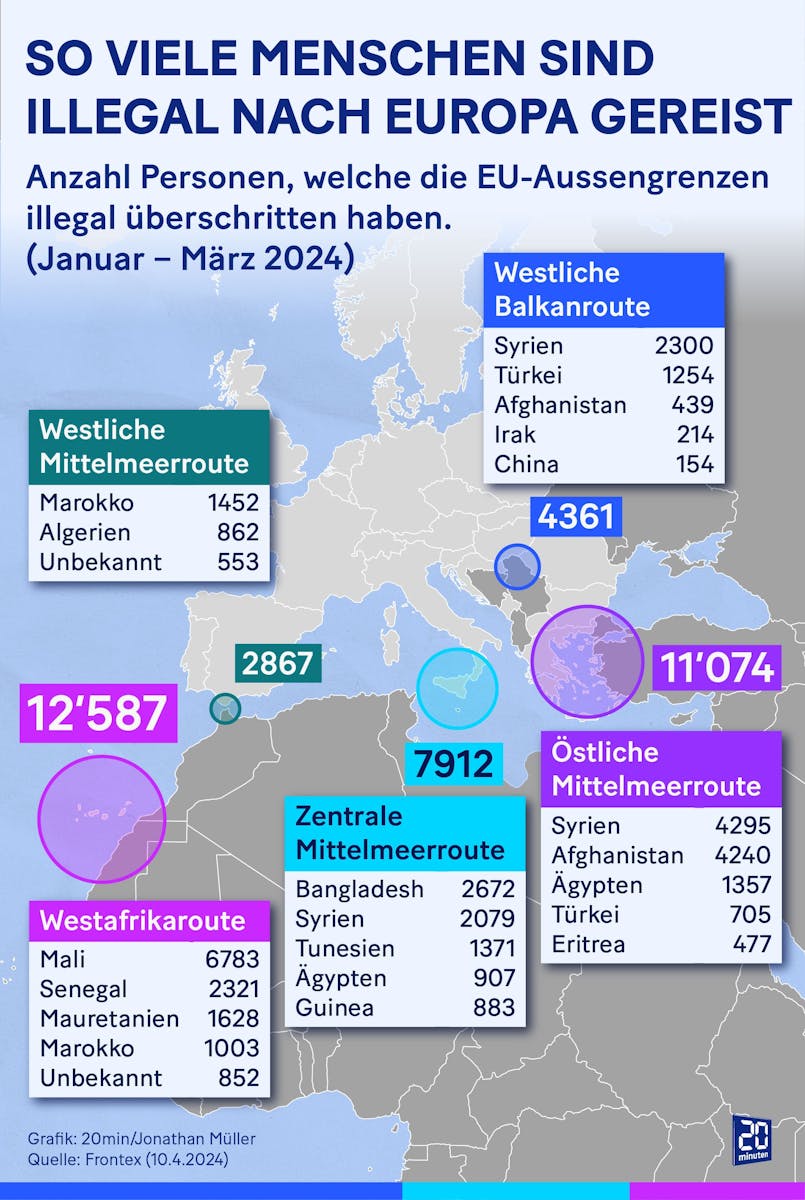Published
MigrationIntegration Crisis in Europe: These Are the Reasons for an EU Asylum Deal
EU tightens screws on asylum policy The impetus for this was the migration crisis of 2015 and 2016. This led to coordination difficulties and an increase in crime.


- Van
-
On Wednesday, the European Union Parliament decided on tougher rules to deal with illegal migration.
-
This was preceded by years of uncertainty, strife and a migration and integration crisis in various countries.
-
In the wake of the crisis, right-wing parties gained momentum and pressured governments to address the migration issue.
More than 2.5 million people arrived in Europe seeking asylum in 2015 and 2016. In the following years, the refugee crisis became an integration crisis and fueled tensions across Europe. On Tuesday, the European Union Parliament decided to adopt the asylum deal after years of bitter struggle.
The high number of asylum seekers since 2015 has increased the number of asylum claims in various countries. Tens of thousands of migrants arrived in Europe via the central or eastern Mediterranean. They are literally stranded in Italy and Greece.

From January to March 2024, around 35,000 asylum seekers arrived in Europe illegally.
20 min/Jonathan Muller
Italy and Greece groan under streams of refugees
Both countries are overwhelmed by this: from the beginning of the year to the autumn of 2023 alone, more than 140,000 people arrived in Italy, twice as many as in 2022. In April 2023, Italy declared an asylum emergency. So one goal of the Asylum Agreement is to support these two countries.
Overburdening the asylum system has led to integration problems and increased crime in many European countries. Only on Tuesday did German Interior Minister Nancy Fasser have to admit: Germany has a problem with crimes committed by non-German suspects.
Ajo Joshua (30) traveled illegally to Lampedusa from Nigeria. In September 2023, he recounted a long, difficult escape for 20 minutes.
20 min
Germany: Perceived uncertainty is rising
Among the total population, the number of violent crimes increased by 8.6 percent in 2023 over the previous year—and the number of violent crimes committed by immigrants also increased by 14.5 percent. The increase was even greater for crimes such as robbery and theft: it rose 22 percent among immigrants.
At the same time, Germany's sense of security is waning. The initial spark for this was New Year's Eve in Cologne in 2016: at that time, countless sexual assaults on women took place, mainly by young men from North Africa and Arab countries. A representative survey in January 2024 showed: More than half of Germans thought Germany was less safe in the past twelve months. Reasons: extremism, war in Ukraine, Donald Trump. But migration.
Europe is moving to the right
As debates dragged on in the EU, political and social pressure mounted on countries. Right-wing parties such as Germany's AfD, Fratelli d'Italia and the Sweden Democrats have taken the asylum issue into their own hands and won big with voters. One of Prime Minister Georgia Maloney's election promises was to crack down on illegal immigration – so far without success.
Some countries acted on their own under this pressure: Denmark, for example, relied on containment and isolation. There is broad political consensus to allow as few asylum seekers into the country as possible. Since 2019, residence permits for refugees are generally granted for a limited period of time and, if possible, cannot be extended or revoked. Benefits for asylum seekers were cut, residency and registration requirements were tightened, and repatriation was made easier.
Countries' reaction: Denmark resettles migrants
The EU's migration deal is now due to come into force from 2026. “We have succeeded in ending the political deadlock that has characterized the migration issue for years. Now the EU can regain control of its external borders, curb economic migration and introduce a common migration policy that works well and is designed to last,” said Swedish MEP Thomas Tobbe.
Whether the measures will actually be implemented and how well they are working will become clear from 2026 onwards. Political observers believe voter pressure on politics will continue unless the EU finds a workable solution to the immigration problem. And with it the infiltration of right-wing parties.
Are you stalking on WhatsApp for 20 minutes?
Morning and end of day news overview, surprising stories and breaking news: Subscribe to the 20-minute WhatsApp channel and get regular updates with our best news straight to your cell phone.

“Wannabe pop culture fanatic. Zombie advocate. Entrepreneur. Internet evangelist. Alcohol fanatic. Typical travel buff.”





More Stories
Choosing the Right Quality Management Software for Your Industry
If guests bring items: Can shower gel be packed from the hotel?
Digital Technologies for the Elderly: Increasing Aging at Home – News